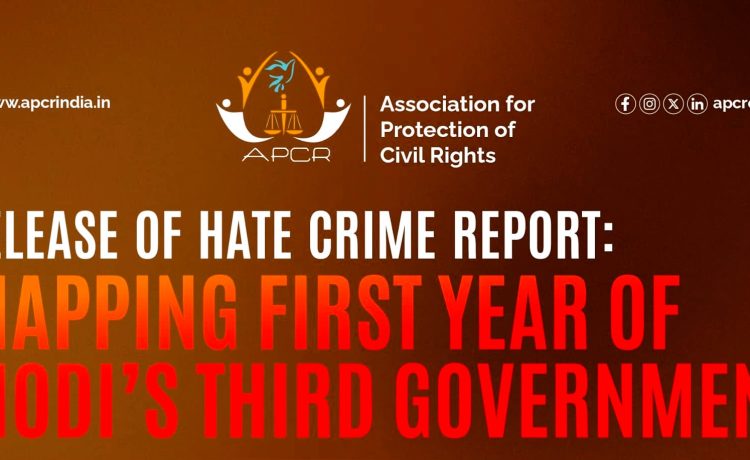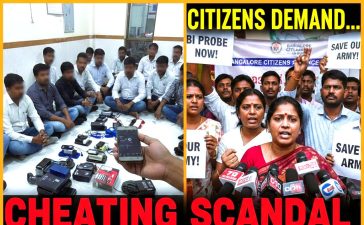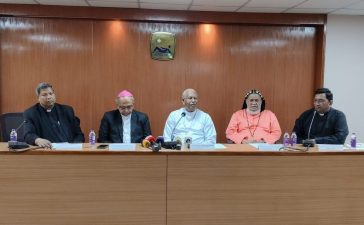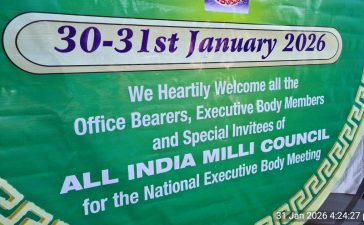Rampant Hate, Hollow Justice: India’s Grim Human Rights Landscape One Year On
A Troubling Record of State Complicity and Impunity
One year after a spate of horrific incidents shook India’s conscience, the response of state authorities continues to be marked by indifference, impunity, and inaction. From Manipur’s unending ethnic violence to the razing of Muslim homes in Nuh and the bulldozer-driven demolitions in Khargone and Delhi’s Jahangirpuri, victims have been left without justice, while perpetrators roam free — in many cases shielded or emboldened by political patronage.
The Hate Crime Tracker (HCT), in its June 2024–May 2025 update, offers a scathing indictment of the Indian and Karnataka governments’ failure to act against hate crimes and protect vulnerable communities. The tracker, maintained by a group of human rights defenders, documents dozens of incidents across India, offering a sobering reminder of the rising tide of targeted hate and state complicity.
“Governments that do not uphold the constitutional rights of all citizens equally must be held to account,” said one of the human rights defenders involved in compiling the tracker. “These are not isolated cases — they reflect a pattern of systemic bias and deliberate neglect.”
Manipur: A Year of Brutality and Betrayal
In Manipur, 12 months have passed since brutal mob violence erupted in May 2023. The carnage was staggering: over 220 lives lost, 60,000 displaced, and entire villages torched. Yet, even today, the state is grappling with severe displacement, a militarised environment, and the erasure of justice.
“The two Kuki women who were stripped and paraded in the street, a scene that shocked the world, still await justice. Despite the Supreme Court’s intervention, progress has been abysmal,” stated a Manipur-based activist.
With internet bans in place for most of the past year and civil liberties severely curtailed, the state government, led by the BJP, has done little to bridge the deepening ethnic divides. Worse, it has been accused of open bias against tribal communities.
“We don’t want condolences. We want accountability,” said a Kuki community representative.
Nuh and Gurugram: Bulldozers, Not Justice
In the aftermath of violence sparked by Hindutva provocateur Monu Manesar’s inflammatory “religious” rally in Haryana’s Nuh district, Muslim homes were razed in large numbers. In Gurugram, a mosque imam was lynched, and the administration responded not by protecting survivors but by punishing them — unleashing bulldozers on their settlements without due process.
“We were made homeless for being Muslim,” said one resident whose home was razed. “No notice, no hearing — just demolition.”
Despite the Punjab and Haryana High Court’s scathing observations about these actions resembling “ethnic cleansing,” no significant legal action has been taken against the guilty. Meanwhile, Monu Manesar, previously accused of murder, remains a free man and even enjoys social media influence.
Khargone and Jahangirpuri: The Bulldozer as a Weapon
In Madhya Pradesh’s Khargone, Muslims faced collective punishment following communal violence during Ram Navami in 2022. Houses and shops belonging to the community were bulldozed — an extra-judicial act championed by the state government as “swift justice.” A similar scene played out in Delhi’s Jahangirpuri after the 2022 Hanuman Jayanti violence, where predominantly Muslim homes were razed despite a stay order from the Supreme Court.
“This is not urban planning. This is collective retribution,” said a Delhi-based legal researcher.
In neither case has there been any substantial compensation, rehabilitation, or fair investigation. The so-called perpetrators are still in jail, while those who incited or led the mobs walk free.
Karnataka: Rights Under Siege Despite a Secular Mask
Despite the Congress government’s claims of upholding secularism in Karnataka, multiple instances show the continuation — and sometimes worsening — of communal policing. In April 2024, Muslim youth in Mangaluru and Davanagere were arrested and beaten for raising “objectionable slogans” during religious events. In Hassan, college students were suspended for wearing Palestinian scarves during a protest.
“What we see in Karnataka is soft Hindutva wrapped in secular jargon,” remarked a civil liberties activist.
In December 2023, a Dalit man was lynched in Vijayapura for allegedly stealing cattle. The attackers roamed free even as the victim’s family cried for justice. This pattern repeats across caste and communal lines — a shared experience of state apathy and lawlessness.
Activists Refuse to Back Down
Amidst this grim landscape, the resolve of human rights defenders and grassroots organisations has been a beacon of resistance. Groups like PUCL, Human Rights Defenders Alert, All India Lawyers Association for Justice, and the National Campaign Against Torture have documented, litigated, and fought for the rights of victims, often at great personal risk.
The Hate Crime Tracker, initiated and maintained by volunteers and legal experts, continues to chronicle hate incidents with meticulous detail — often the only form of official record-keeping in the face of state erasure.
“We don’t just track hate crimes — we track the silence of the state,” said one tracker volunteer. “And silence, when it comes to injustice, is complicity.”
A Call for Constitutional Morality
The report urges the judiciary, civil society, and opposition parties to rise to the occasion and defend India’s constitutional values. It highlights the dangers of normalising bulldozer justice, communal bias, and caste atrocities through political silence or media distraction.
“Justice delayed is not just denied — it’s buried,” said a senior legal scholar associated with the initiative. “And when the state becomes the enabler of hate, democracy dies in instalments.”
The Hate Crime Tracker does not merely present numbers — it tells stories of lives disrupted, of children orphaned, of women brutalised, of dreams crushed under the weight of hate. Its publication serves as both a warning and a call to action.
Conclusion: The Urgency of Justice
As India moves deeper into the 2024–25 political calendar, the real test lies not in the ballot box, but in whether the rule of law can be resurrected amid growing lawlessness. The government must be reminded that it is not merely a custodian of power, but a trustee of the Constitution.
The shameful inaction in the face of repeated atrocities against Muslims, Dalits, Adivasis, and dissenters must end. And those who resist — the lawyers, the students, the volunteers, the grieving families who refuse to give up — must be supported, celebrated, and protected.
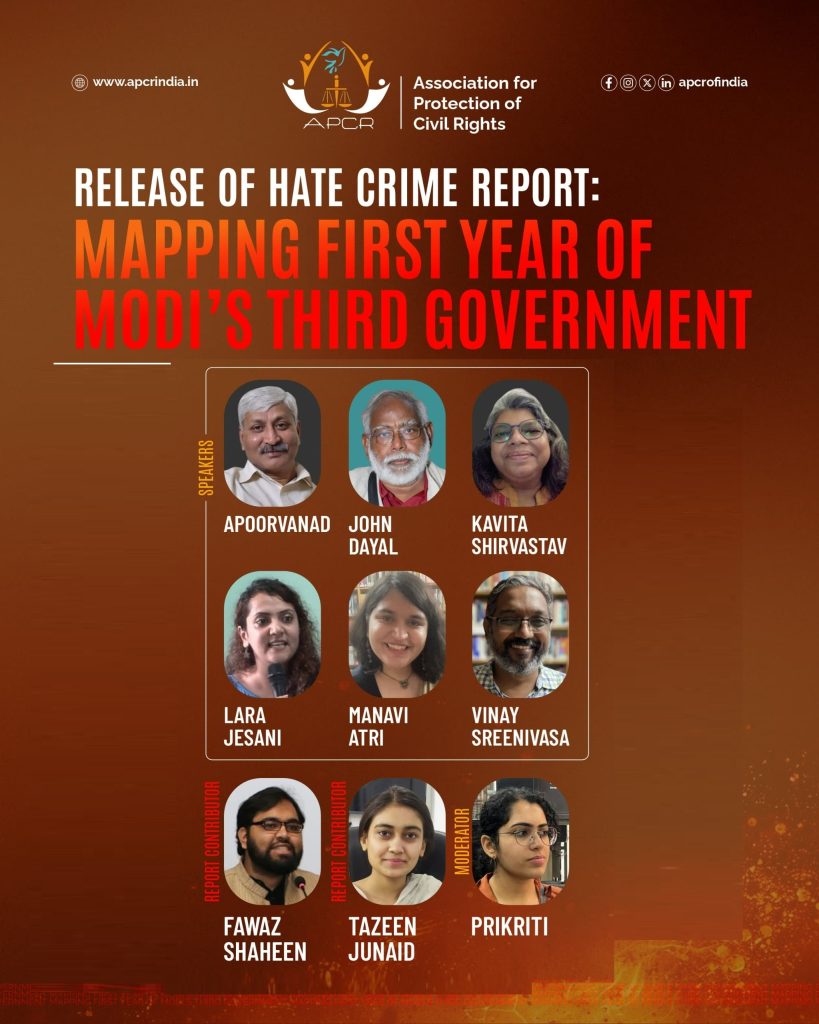
#HateCrimeTracker #JusticeForManipur #BulldozerPolitics #CommunalViolence #DalitLivesMatter #KarnatakaWatch #StopMobLynching #HumanRightsIndia
🔹 Short Summary
The Hate Crime Tracker (HCT) report for June 2024–May 2025 reveals a disturbing trend of unchecked hate crimes across India. It exposes state complicity in violent incidents targeting Muslims, Dalits, and Adivasis, and condemns the silence and inaction of the Indian and Karnataka governments. From Manipur to Jahangirpuri and Khargone to Nuh, the pattern is consistent — state machinery enables perpetrators while silencing victims. Despite the grim realities, human rights activists continue to track, protest, and fight for justice.
🔹 Context and Background
-
The Hate Crime Tracker is an independent civil society initiative that documents hate crimes, discrimination, and state violence in India.
-
The current report covers incidents from June 2024 to May 2025.
-
Major incidents in the report include:
-
The continued crisis in Manipur (post-May 2023 violence).
-
Bulldozer demolitions targeting Muslims in Nuh, Khargone, and Jahangirpuri.
-
Communal and caste-based violence in Karnataka under Congress rule.
-
Systematic state inaction and judicial silence in the face of major constitutional violations.
-
🔹 Key Quotes
✳️ From Human Rights Defenders:
“This is not a law-and-order issue — it’s a moral collapse of the state.” – Human Rights Tracker Volunteer
“Our tracker doesn’t just log crimes. It records the betrayal of constitutional promises.” – Legal researcher involved in the report
“Bulldozers don’t deliver justice — they erase evidence of state failure.” – Civil rights activist, New Delhi
“We’ve reached a point where the act of documenting injustice is itself an act of resistance.” – Hate Crime Tracker team member
✳️ From Survivors:
“They demolished my home without warning, without proof, without mercy — just because I’m Muslim.” – Nuh violence victim
“My husband was killed in front of my eyes. Police didn’t come. No one came.” – Dalit woman in Vijayapura, Karnataka
“We’re not refugees. We’re citizens. And still, we live in camps a year later.” – Displaced Kuki woman, Manipur
🔹 Q & A
Q1: What is the purpose of the Hate Crime Tracker (HCT)?
A: The HCT tracks incidents of hate crimes, communal violence, caste atrocities, and state excesses across India to hold governments accountable and support victims’ fight for justice.
Q2: What are some of the key findings in this year’s tracker?
A: The tracker highlights continuing violence in Manipur, targeted bulldozer demolitions in Muslim neighborhoods, police apathy in Dalit lynching cases, and suppression of protest voices, especially in BJP- and Congress-ruled states.
Q3: Is Karnataka exempt from such hate crimes under Congress?
A: No. Despite the Congress government’s secular claims, incidents in Mangaluru, Davanagere, Hassan, and Vijayapura show continued attacks on Muslim youth and Dalits, often without accountability.
Q4: What action has the government taken so far?
A: Very little. In most cases, perpetrators are free, victims are still waiting for rehabilitation, and governments have responded with denial or bulldozers instead of justice.
Q5: What do human rights defenders want?
A: Immediate judicial action, fair trials, rehabilitation of victims, and a public condemnation of hate crimes by top political leaders. Most importantly, an end to state complicity in violence.
![]()

